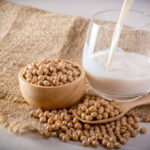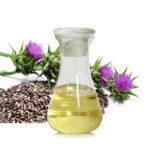Nutritional Value of Milk to Health
It is important to know the nutritional value of milk as it helps to know what nutrients that are lacking and at the same time, the nutrients that are in abundance. This is because it helps to know which nutrient to supplement. According to moh.gov.sa, it is the richest natural food fr humans.
The nutritional value of milk will help you determine how you should consume other foods that are high in sodium especially in cases of arterial hypertension or renal output.
However, milk is one of the complete if not possibly the most complete food that is in existence a result of the wide variety of nutrients it holds. However, it is lacking in vitamin C as well as iron.
SEE ALSO: Yogurt Benefits
Milk, whole composition
This information is based on per 100 grams of raw edible portion
Energy = 61.4 kcal = 257 kj
Carbohydrates = 4.66 g
Protein = 3.29 g
Fiber = ___
Vitamin A = 31.0 µg RE
Vitamin B1 = 0.038 mg
Vitamin B2 = 0.162 mg
Niacin = 0.851 mg NE
Vitamin B6 = 0.042 mg
Folate = 5.00 µg
Vitamin B12 = 0.357 µg
Vitamin C = 0.940 mg
Vitamin E = 0.100 mg α-TE
Calcium = 119 mg
Magnesium = 13.4 mg
Phosphorus = 93.4 mg
Iron = 0.050 mg
Zinc = 0.380 mg
Potassium = 152 mg
Saturated Fat = 2.08 g
Total Fat = 3.34 g
Sodium = 49.0 mg
Cholesterol = 13.6 mg
Percentage Composition
Carbohydrates = 4.66%
Fat = 3.34%
Protein = 3.29%
Minerals = 0.720%
Water = 88.0%
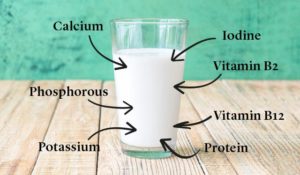
Percentage (%) Distribution of fatty acids
Monounsaturated = 0.965 g
Polyunsaturated = 0.124 g
Saturated = 2.08 g
This is information is based on the information provided by Dr. George D. Pamplona-Roger in his book, “Encyclopedia of Foods and their healing power”.
Nutrients in Milk
Milk is the most complete single food because it makes available every necessary nutrient, however, nutrients such as iron and vitamin C are available in small amounts that’s somewhat negligible. Therefore, in nutritional value of milk, it is deficient in the following nutrients:
- Vitamin C
- Fiber
- Iron
Nutrients Regarding Nutritional Value of Milk
The following are the nutrients that can be found in milk. They are:
- Protein
- Carbohydrates
- Fat
- Vitamins
- Minerals
- Water
YOU MAY LIKE: Nutritional Value of Vegetables
Protein
It is easy to digest milk proteins and to get it assimilated is quite easy. There are two types of milk protein which are:
- Casein which makes up about 82% functions and coagulates forming a white curd. However, it is lacking in amino acids methionine and cystine.
- Whey protein is of 18%: they are water soluble and tends to be complete than casein.
Carbohydrates
Nutritional value of milk regarding carbohydrates has lactose as its most important, a disaccharide sugar. Carbohydrate is 4.66% per 100 grams of raw edible portion. Its molecules are formed by the union of galactose and glucose.
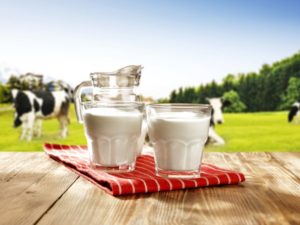
The lactose in milk promotes calcium absorption and the intestinal bacteria convert it to lactic acid which helps in preventing the growth of intestinal pathogens.
The galactose on the other hand promotes the development of the bacteria in the intestinal flora which is responsible for synthesizing biotic and other B complex vitamins.
Fat
Fat content in milk is 3.3% per 100 grams. However, saturated fat is predominant, particularly in cow’s milk; and represents 65.8% of total fat. At ambient room they tend to become liquid contrary to other animal fats.
One of the primary functions is the facilitation of gastric juice and making them to be assimilated quite easily. The cholesterol content in milk is 13.6 mg per 100 grams.
Vitamins
Nutritional value of milk in terms of its vitamins shows that milk contains a wide variety of vitamins but a very poor source of vitamin C.
Milk contains fat and water soluble vitamins (liposoluble and hydrosoluble respectively). In liposoluble vitamins, various amount of vitamin A, a little D, E and K. It is noteworthy that sterilization and pasteurization diminish the content of these vitamins.
Hydrosoluble vitamins: Quite available in moderate amount but vitamins B2 and B12 are quite abundant.
As stated earlier, vitamin C is deficient in milk unless one is ready to consume about six liters of milk in order to receive 60 mg of vitamin C needed daily.
Minerals
The nutritional value of milk in this regard is just complete as it contains all the minerals and all trace elements we know. The following are some of the minerals we can find in milk.
- Calcium
- Sodium
- Zinc
- Iodine
- Iron
Calcium: This is the highest mineral that is available in milk. We can get 800 mg of calcium which is needed daily by kids to 10 years of age or an adult. Three glasses of milk can provide us this nutrient with regard to nutritional value of milk.
Sodium: The content of this mineral is somewhat high making about 49 mg per 100 grams. One liter of milk can provide us 500 mg of sodium and this is the Recommended Daily Allowance (RDA).
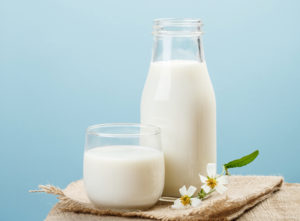
It is important to use milk and other dairy products with caution especially where there are cases of arterial hypertension or renal output.
However, we can get diminished-sodium milk in the market.
Zinc: We can get 3.8 mg of zinc per 100 grams, 30% of Recommended Daily Allowance RDA
Iodine: The content of this element depends on where the animal has fed. At the coast, milk is 37 µg per 100 grams and in essence, two glasses of milk provide the Recommended Daily Allowance RDA.
However, milk from the inlands contains about 13 µg per 100 grams. But feeding cows iodized salt will help increase the iodine level in the milk.
Iron: Nutritional value of milk in terms of this nutrient is somewhat negligible because it would take up to 20 liters of milk to meet the 10 mg Recommended Daily Allowance RDA of iron.
Water
Milk holds less water, an so more solids than various vegetables and fruits.
Rheumatoid Arthritis Foods to Eat

A graduate of Computer Science and Information Management Technology. Diploma – Caregiving, Certificates – Dementia and Diabetes Awareness and Management. A researcher, blogger, songwriter, singer and acoustic guitarist. Born in an environment where natural talents such as healing are imparted at our natural birth. This natural talents of healing is the result of our genetic inheritance and the training from family environment.



